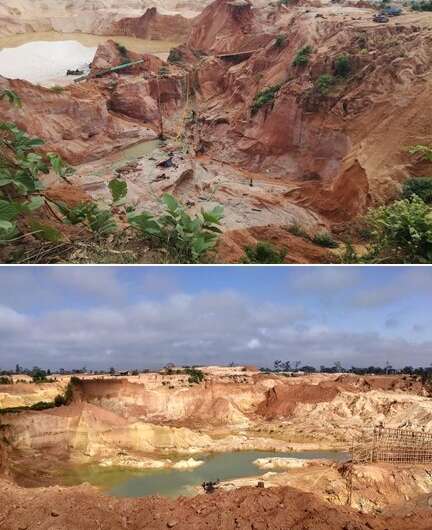Better approaches needed to tackle informal gold mining

NUS ecologists found that current approaches involving enforcement and provision of alternative livelihoods are unlikely to succeed in deterring informal gold mining in Myanmar.
Gold symbolises power, wealth and beauty all over the world, but it comes at a price. Gold mining in the tropics is a contributor to environmental damage such as deforestation and mercury emissions, as well as a range of social outcomes including migration, increased health risks and even human rights abuses. Much of the world's gold is mined by individuals and small businesses that operate without legal permits. These miners, known as informal gold miners, were estimated in 2011 to number around 16 million and to have produced 380 to 450 tonnes of gold. The informal gold mining sector is economically significant but detrimental to biodiversity conservation and global health, as it is the largest source of mercury emissions caused by human activities.
The country of Myanmar is increasingly integrated into regional and global markets, and it has a rapidly expanding informal gold mining industry that has profound environmental impacts. Two widely espoused policies to mitigate the negative effects of informal gold mining are: (1) increasing enforcement to make it unprofitable, and (2) offering alternative livelihoods that can provide similar or better economic benefits. A research team led by Prof Edward WEBB, Department of Biological Sciences, NUS conducted the first-ever study of the costs imposed by enforcement, the level of enforcement required to make informal gold mining unprofitable, and the potential benefits associated with alternative agriculture-based livelihoods. They found that neither increasing enforcement nor improving agriculture-based livelihoods were likely to stop informal mining because it was simply too profitable.
Survey involving participants in the informal mining sector
In collaboration with Wildlife Conservation Society (WCS) Myanmar and the Myanmar Forest Research Institute, the research team interviewed more than 225 respondents involved in the informal gold mining industry in Homalin township (in northern Myanmar) to understand the dynamics of informal gold mining activities (such as the motivation to participate in mining), assess the profitability of informal mining, and estimate losses associated with law enforcement. The survey participants included mine owners and workers in both the formal and informal sectors and local farmers.
The researchers found that while police inspections impose costs (due to lost equipment and lost time for mining), informal gold mining is so profitable that miners can rapidly recoup the costs involved. They also found that many of the miners already balance mining with agriculture, so government plans to provide agricultural land are unlikely to deter the miners. Furthermore, as many of the miners were internal migrants and willing to migrate again for economic opportunities, policies to replace informal mining might simply shift it to new regions within Myanmar.
Potential solutions to informal mining activities
Dr. Graham Prescott, a research fellow on the team said, "Given that most informal miners operate on mine sites abandoned by the formal sector, one approach could be to allow informal mining on these sites and focus instead on preventing the expansion of informal mining to forests and wetlands. Technologies that eliminate mercury emissions, such as the use of mining retorts could also be introduced to the informal mining communities."
"An important approach is to promote the formalization of the informal gold mining sector. Informal gold miners would benefit from the legitimization of their livelihood, protection against eviction and better health and safety practices, while society could benefit from the compliance with environmental regulation to prevent expansion of mining in environmentally sensitive areas and reduced mercury emissions," added Prof Webb.
Although gold mining in Myanmar is expected to continue, policies should be crafted and enforced to ensure that the industry is legal, formal and well-regulated for the benefit of all.
More information: Graham W. Prescott et al. Gold, farms, and forests: Enforcement and alternative livelihoods are unlikely to disincentivize informal gold mining, Conservation Science and Practice (2020). DOI: 10.1111/csp2.142
Provided by National University of Singapore



















